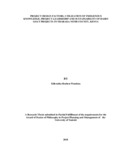| dc.description.abstract | The reproductive health outcomes of teenagers in less developed countries are among the worst. Adolescents who make for one in five of all reproductive-age women in Africa comprise 24.5% of Kenya's total population, that is 11.6 million, according to the 2019 census. With proper implementation, projects that support youth-friendly ASRH can narrow the gap. This study aimed to determine how stakeholder involvement in Project Lifecyle Management influenced the success of ASRH projects at the MSF youth-friendly clinic in Dandora, Kenya. The main objectives of the research were to determine the effects of stakeholder involvement in project identification, planning, execution, and monitoring on the outcomes of the ASRH project at Nairobi County's Dandora II Health Center.
The study adopted the stakeholder theory, which highlights that participatory development is necessary to get the best possible outcomes. A mixed-method approach was used to gather data for the descriptive research study design. Adolescents participating in ASRH activities at the Dandora Youth Friendly Center, healthcare providers, local authorities, and ASRH project administrators provided data. Quantitative data was analyzed using statistical methods such frequency, percentage, mean, and standard deviation distributions of descriptive statistics, while qualitative data were subjected to theme analysis. Tables were used for presenting the results.
45 respondents, around 92% of the targeted 49 responded. A comparison of the mean scores of the various stakeholder groups during the project cycle indicates which ones are more likely to be involved, influential, and present at every stage. An examination of mean replies across all independent factors indicates that youth-friendly sexual reproductive activities cannot succeed without stakeholder involvement in project cycle management. The results of the study show that effective stakeholder interaction, a critical business management strategy, is essential to the optimal functioning of ASRH initiatives. Stakeholders possess the ability to impact or influence the project's result and demonstrate interest in it. In addition to having an interest in the project's success, their engagement involves forging and maintaining contacts.
The study concluded that effective stakeholder engagement makes it feasible for policies, initiatives, programs, and services to be better planned and informed. The study's findings provide insight into the crucial connection between effective stakeholder engagement and the greatest benefits for efforts aimed at promoting youth-friendly ASRH. Many recommendations are made to enhance the participation process and increase the importance of these projects even further. The development of customized training programs with a focus on PCM understanding for ASRH project participants; To ensure that stakeholders are informed and have a voice in the project, it is important to create frequent feedback mechanisms and forums as part of the construction of transparent and robust communication channels. Incorporating stakeholder feedback into ASRH project decision-making processes is another recommendation.
Lastly, the report recommends frequent monitoring and evaluation of stakeholder participation programs. This assessment would identify barriers, gauge stakeholder satisfaction, and encourage flexible strategies. Adolescent Social and Mental Health (ASRH) projects can ensure long-term success through continuous improvements based on feedback and performance reviews. While local engagement is crucial, regional and national institutions—such as governmental bodies and non-governmental organizations—can collaborate with youth-friendly ASRH programs to enhance their scalability and sustainability. | en_US |




